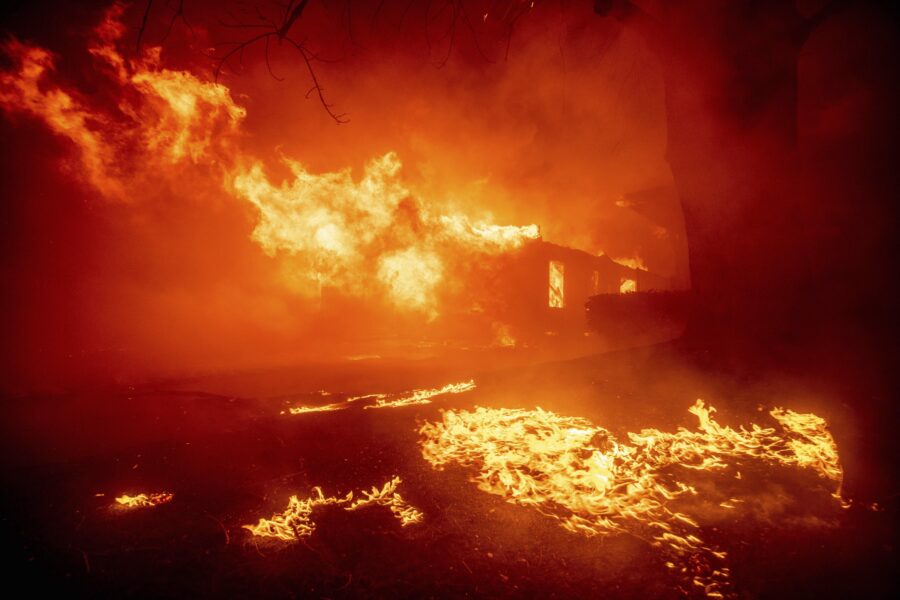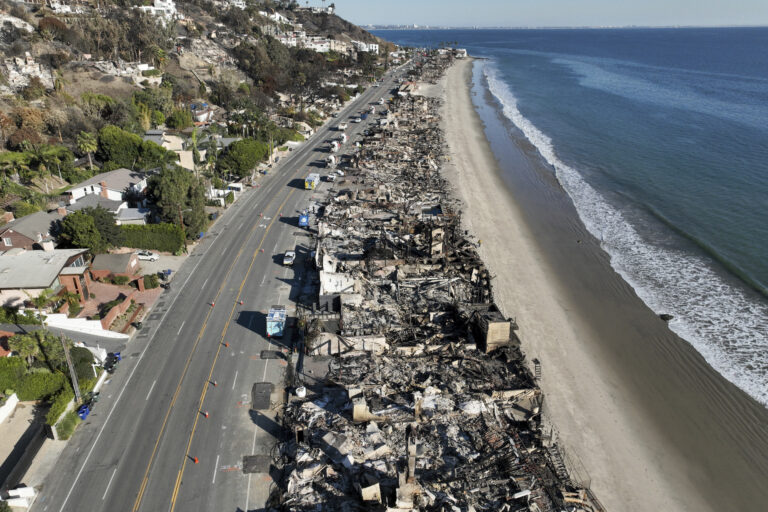(In photo: An aerial view shows the devastation from the Palisades Fire on beachfront homes Wednesday, Jan. 15, 2025 in Malibu, Calif. (AP Photo/Jae C. Hong, File)
Bermudian reinsurers — as happens whenever a major catastrophe strikes — stand to foot a hefty portion of insurance losses emanating from the wildfires that ravaged the Los Angeles area in January.
Early estimates from carriers including RenaissanceRe, Arch Capital, Everest Group, Conduit Re and Hamilton Insurance Group, suggest the reinsurance support from Bermuda will be worth billions of dollars to the stricken area.
The sheer scale of the losses from the Eaton and Palisades blazes, which razed miles of city blocks and left at least 29 people dead, was unprecedented. Total property and capital losses could total as much as $131 billion, according to a report by UCLA’s Anderson School of Management, while insured losses are expected to come in between $40 billion and $50 billion, of which Moody’s expects reinsurers to bear at least 30 per cent.

One of the questions raised by this tragic event are why the proportion of losses insured were not higher given that this event happened in a relatively wealthy area of a very wealthy country.
That lack of insurance penetration was noted by AM Best’s Dan Hofmeister, who said in an interview with Bermuda Re & ILS: “It’s odd because a lot of it involves extremely wealthy individuals with less coverage than they probably should have.”
One issue is that it has become harder to get coverage — insurers and reinsurers have reduced their exposure to wildfires in the face of increasing risk. Some major carriers stopped writing new business.
Drier and warmer conditions, as well as increasing development in at-risk zones have made damaging blazes more frequent. Nine of the ten costliest wildfires in US history, ranked by inflation-adjusted insured losses, have occurred in the past eight years, according to the Insurance Information Institute.
In California, state regulations for many years required insurers to price coverage only based on past experience, effectively limiting insurers’ ability to charge premiums that reflected their true exposure. As private insurers pulled back, the FAIR plan — the state-operated insurance backstop — had to take more of the strain, leaving taxpayers on the hook when losses occurred.
Evan Greenberg, chief executive officer of Chubb, explained during the company’s fourth-quarter earnings call in January: “In the area where the wildfires occurred, our exposure has been reduced by over 50 per cent,” Mr Greenberg said. “We’re not going to write insurance where we cannot achieve a reasonable risk-adjusted return for taking the risk.”
The FAIR Plan stepping in to provide underpriced coverage to fill the gap left by retreating insurers was not a sustainable solution, Mr Greenberg said. “One way or another, the citizens of the state pay the price for coverage,” he added.
Chubb, a Swiss-based re/insurance giant with an office in Bermuda from where it writes property reinsurance among other lines, in January estimated its losses from the LA wildfires at $1.5 billion.
California has implemented recent rule changes that allow insurers to use catastrophe modelling for the first time and to pass on reinsurance costs to customers.
Though this will mean higher premiums for homeowners, it will also increase the supply of coverage. As Ricardo Lara, the California Insurance Commissioner, told delegates at the Bermuda Risk Summit in March: “We have to get to availability to get to affordability.”
Mr Lara’s presence at the conference spoke volumes about how the Bermuda market is regarded as having an important role in covering large, global risks. He said now was the time for insurers and regulators to show “bold and creative” leadership to address the growing risk, particularly incentivising more mitigation in the form of more fire-resilient buildings.
The impact of the wildfires on reinsurance capital will be about the same as a major hurricane, analysts have noted. However, it will eat through a substantial chunk of some reinsurers’ annual catastrophe budget within the first quarter, so they will be keeping fingers crossed for a relatively quiet hurricane season later in the year.
While the wildfires will cost the Bermuda market billions of dollars, the flipside is that every claim paid is a reminder of its value proposition — to be there when disaster strikes to help businesses and communities recover.

